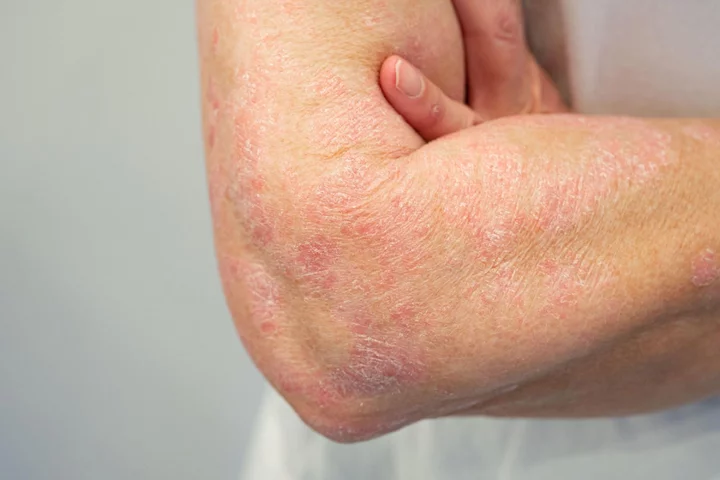
Economists Slash Hong Kong Growth Forecasts After GDP Miss
Economists are downgrading their forecasts for Hong Kong’s economic growth this year following worse-than-expected data for the second
2023-08-01 17:48

US restricts visa-free travel for Hungarian passport holders, citing security concerns
The United States is imposing travel restrictions on citizens of Hungary over concerns that the identities of nearly 1 million foreigners granted Hungarian passports over nine years were not sufficiently verified
2023-08-01 17:22

Psoriasis Awareness Month: Everything you need to know
Psoriasis has been a hot topic in the health world in recent years, thanks in part to one very vocal – and very famous – celebrity. Kim Kardashian has shared the ups and downs of her experience with the skin condition on TV and social media, and penned a piece on the subject for her sister Kourtney’s website Poosh. “When I was 25, I had my first psoriasis flare-up,” the reality star and entrepreneur wrote. “I got a common cold, and since psoriasis is an autoimmune condition, this triggered it. It was all over my stomach and legs.” After an injection of cortisone recommended by a dermatologist, the symptoms went away for five years, but came back when Kardashian was in her 30s. “Psoriasis can start at any age, but most often develops in adults between 20 and 30 years old, and between 50 and 60 years old,” says Dr Nisa Aslam, a GP from Typharm’s Skin Life Sciences Foundation. “The severity varies greatly. For some people, it may be relatively minor, whilst for others, psoriasis has a huge impact on quality of life.” In the case of Kardashian, her psoriasis – which has no known cure – also went away during her two pregnancies, but came back after and has fluctuated ever since. “I’ve become extremely comfortable with my psoriasis,” she continued in her essay, revealing that sometimes she covers it up with body make-up and sometimes she doesn’t. “I hope my story can help anyone else with an autoimmune disease feel confident that there is light at the end of the tunnel.” To mark Psoriasis Awareness Month in August, these are the key facts you need to know about the chronic condition… What are the symptoms of psoriasis? “Psoriasis is a type of skin disease that affects about 2% of the population of the UK,” says consultant dermatologist Dr Natalia Spierings, author of Skintelligent: What You Really Need To Know To Get Great Skin. “Patients develop thickened red plaques of skin with thick silvery white scale over the top.” The most common places for plaques to appear are the backs of the elbows, the front of the knees, the scalp and the lower back. They may be itchy or painful. “On brown and black skin, the patches can also be purple or dark brown in colour, and the scales may look grey,” says Aslam. Psoriasis is also linked with an inflammatory form of arthritis, known as psoriatic arthritis, which Kim Kardashian was diagnosed with in 2019. Aslam explains: “Psoriatic arthritis affects the nails, joints and can affect the eyes, the cardiovascular system and may cause insulin resistance, leading to diabetes.” What is it caused by? “Psoriasis is an ‘immune-mediated’ disease, which means that the skin is inflamed, due to a dysfunction or abnormality in how the immune system works,” Spierings says. Doctors believe that an overactive immune system speeds up skin cell turnover, which causes plaques. “Normal skin cells will grow and then shed off the top of the surface of the skin in a cycle which takes approximately a month,” Spierings continues. “In psoriasis, this process is sped up to only three or four days, so the skin doesn’t have time to shed off, and therefore the scale builds up on the skin.” Diet and lifestyle factors can cause flare-ups of the condition. “Known triggers include drinking excessive alcohol; family history; smoking; stress and hormonal changes, for instance during puberty and menopause,” says Aslam. “Plus certain medicines such as betablockers, used to treat high blood pressure; throat infections; other immune disorders and skin injuries. Obesity has been shown to double the risk of psoriasis.” What treatments are available? While there is no cure for the chronic condition, it is possible to treat the symptoms during flare-ups. “There are a variety of effective prescribed skin treatment options, from steroid ointments and creams, to the development of new formats like medicated tapes such as Fludroxycortide tape,” says Aslam. “This is a transparent medicated surgical tape impregnated with the steroid Fludroxycortide, which can be cut to size. When applied to the skin, it helps to reduce redness, swelling and itching.” UV light or sun exposure has also been shown to help psoriasis. “But remember that uncontrolled sun exposure also increases your risk of skin cancer and premature ageing,” says Spierings. “If you want to use sunlight therapy for your psoriasis, it is best to do this via a dermatologist using special machines to deliver the UV treatment.” Because it’s an inflammatory condition, psoriasis can be affected by what you eat. “Certain foods, particularly ultra-processed foods high in fat, salt and sugar may cause an inflammatory response,” says Aslam. “It’s important to stick to a healthy diet with plenty of vegetables, fruits, wholegrains, beans and lentils, and oily fish with small amounts of lean meat, and small amounts of dairy if liked.” She adds: “Finding the most effective therapy is often a matter of trial and error, so it’s important to keep going back to your doctor, or dermatologist, for advice.” Psoriasis and mental health It’s important to note that skin conditions like psoriasis can have a detrimental impact on mental health. “A recent Typharm survey found that 23% of those surveyed think others believe they are infectious and 19% think they are perceived as unhygienic,” Aslam says. However, it is not contagious or caused by poor hygiene. “Patients with psoriasis have a high risk of developing depression because of their skin problem,” says Spierings. “It is incredibly important to seek proper treatment if you have psoriasis or think you may have it.” Read More Charity boss speaks out over ‘traumatic’ encounter with royal aide Ukraine war’s heaviest fight rages in east - follow live How to dress in rainy summer weather How to make the Prince of Wales’s Earthshot burger 13 potential cancer symptoms you should get checked out
2023-08-01 15:28

Check Signed by Steve Jobs and Steve Wozniak in 1976 Is Up for Auction
If you happen to own anything from Apple’s early history, it might be worth something.
2023-08-01 09:23

'Barbenheimer' box office sales keep rolling in second weekend
(This July 30 story has been corrected to say that "Barbie" was No. 1 by opening, not total sales, for
2023-08-01 05:49

Credit Karma Review
Credit Karma is an aptly named free personal finance app. Be conscientious about your credit,
2023-08-01 05:16

Simplifi by Quicken Review
Simplifi comes from the company that makes Quicken, but it doesn’t resemble the 30-year-old desktop
2023-08-01 04:59

Rocket Money Review
This is the first time PCMag is reviewing Rocket Money, but it’s not a new
2023-08-01 04:59

NerdWallet Review
NerdWallet's mission is to provide consumers and small businesses with the tools, information, and insight
2023-08-01 04:54

WalletHub Review
The best personal finance apps help you manage and grow your money in different ways
2023-08-01 04:49

Leading anti-abortion group rips DeSantis for not pushing for national ban
A leading anti-abortion organization has criticized Republican Ron DeSantis for not supporting a national ban on the procedure, calling the Florida governor’s position “unacceptable” as he seeks the GOP nomination for president
2023-08-01 03:57

Abortion providers sue Alabama to block prosecution over out-of-state travel
By Brendan Pierson Healthcare providers and an abortion rights group on Monday sued Alabama in an effort to
2023-08-01 02:54
